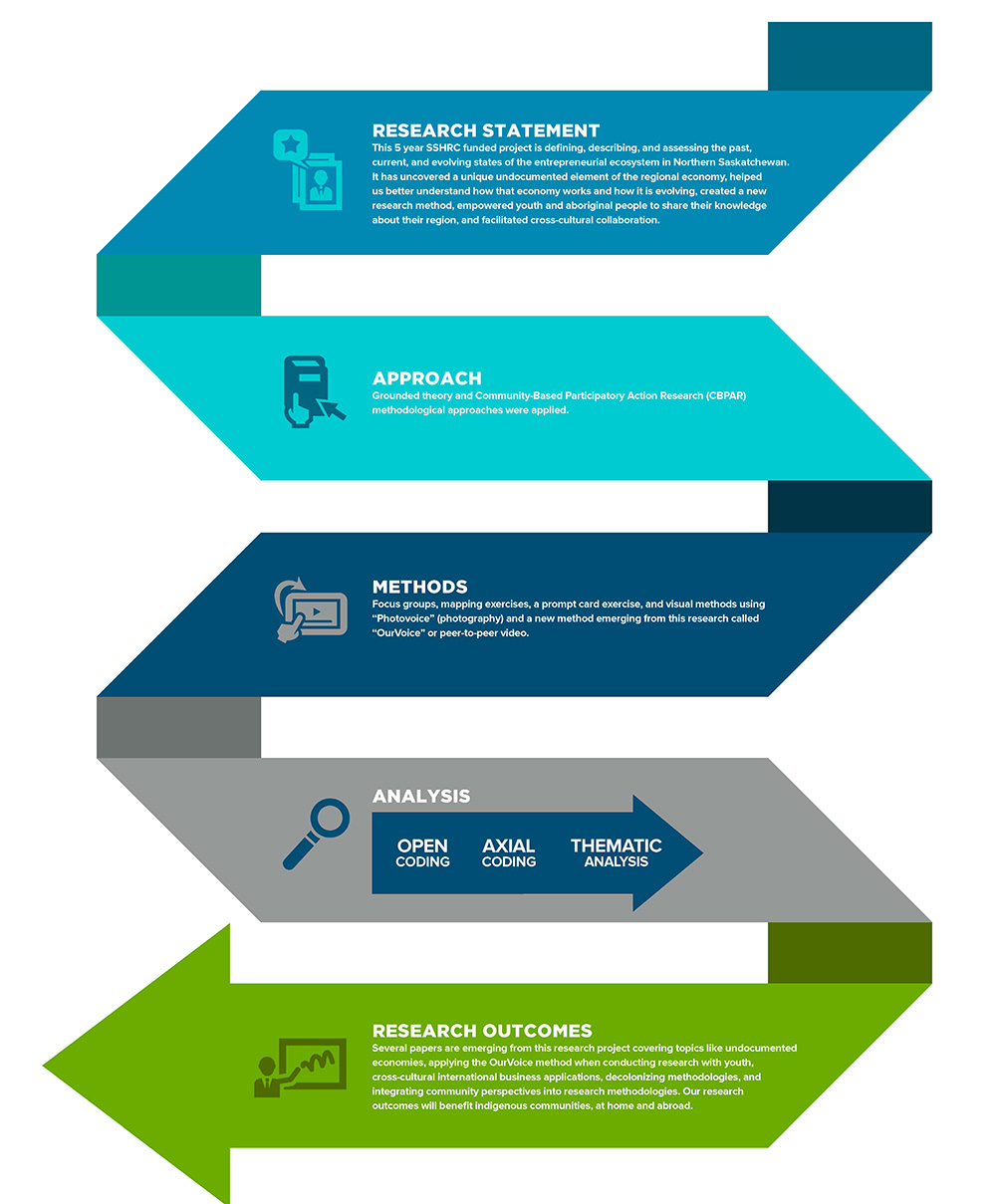
Building Northern Capacity Through Aboriginal Entrepreneurship
In partnership with seven northern Saskatchewan communities, the "Building Northern Capacity through Aboriginal Entrepreneurship: A Canadian Scandinavian Comparative Study" is a community-based, five-year project initiated in 2012 funded by the Social Sciences and Humanities Research Council (SSHRC). The goal is to learn how entrepreneurship contributes to "the good life," well-being, and prosperity. Dr. Lee Swanson and his team have built a network of connections across Northern Saskatchewan, and together are learning about the economic and social aspirations of Northern communities and how entrepreneurship plays, or can play, a role.
Q and A with Lee Swanson
 Q: Is there anything you would like to share about the scope of the project?
Q: Is there anything you would like to share about the scope of the project?
A: This is a large, complex, community-based research project with many moving parts, including community engagement and recruiting, training, and managing a team of research assistants. It is highly rewarding to work on a project like this that can generate substantial benefits for rural and remote communities. We worked in partnership with seven communities to collect data, and we’ve now analyzed that and are sharing the results with them.
Q: What did you find most surprising about this research?
A: I am not particularly surprised that this research project has uncovered new knowledge that northern communities can use. But, I didn’t expect to learn so much about alternative ways to do research. I have learned a lot about visual methods and will use them in future projects because I have experienced how they can produce better results than other methods.
Q: Could you share a bit about the methodology and make-up of the research team?
A: Using the grounded theory approach, which focuses on generating theory emerging from meanings found within data, has helped us uncover new insights and new areas of inquiry. During the first phase of this project, the community partners suggested that we include youth voices, and this became a critical part of this study. A big part of the story is the unique methods we used to capture community perspectives and engage with the youth. We created and applied a multimethod approach that included OurVoice, a peer-to-peer video-based method that yielded the rich data we would not have uncovered with more traditional research methods. The unique approaches we took and the development of OurVoice can be attributed to our interdisciplinary research team, which include faculty researchers and project team members from areas such as business, history, policy, governance, and sociology.
Q: How has this project evolved over the five years?
A: The evolution of the project can be traced back to the initial planning phases. After we were awarded the grant, we took several months to plan the research process. During the first phase, we initiated community partnerships and collaboration with key stakeholders. We interviewed community leaders to ask what entrepreneurship means to them in relation to the good life, well-being, and prosperity. During the second phase, we worked directly with communities to collect data that we analyzed and are now sharing back with them. Twenty-seven different research assistants have worked with us over the course of the project, resulting in lots of student learning and engagement in research. This project has been highly impactful on many levels.
Q: What are some of the key outcomes of this research?
A: The “undocumented economy,” a term used by one of the participants, is a concept that emerged from this project. Our data is supporting inquiries on a particular type of northern governance and access to health and the use of telehealth in northern and Indigenous communities. This research will provide a springboard for other major projects related to social and economic development in rural communities.
For more information on this research project visit the Building Northern Capacity through Aboriginal Entrepreneurship Website.
Recent Publications
Swanson, L.A. & Bruni-Bossio, V. (2018). A Righteous Undocumented Economy. Journal of Business Ethics.
Swanson, L.A., Leader, J., and Landrie-Parker, D. (2016). Effectively engaging with Indigenous communities through multi-methods qualitative data collection and an engaged communications plan. Engaged Scholar Journal, 2(1), 39-56.
KNOWLEDGE MOBILIZATION - RESEARCH COMMUNIQUE FOR COMMUNITIES:
Swanson, L.A., and BNCE Research Team. (January 2017). BNCE research communique: Building community capacity and entrepreneurship in the North (Report). University of Saskatchewan.
The Process

